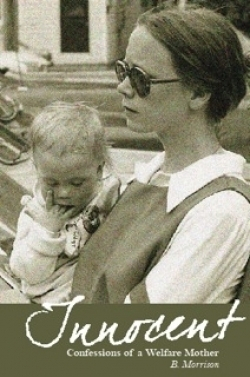Innocent
Confessions of a Welfare Mother
- 2011 INDIES Finalist
- Finalist, Autobiography & Memoir (Adult Nonfiction)
Stereotypes about welfare recipients abound in both the media and the public’s perception, believes author B. Morrison. But it’s not until someone is actually in the position of requiring that level of assistance that he or she finds that perception is not reality.
“According to popular wisdom, I should never have found myself on welfare,” she writes. As an educated, Caucasian woman who grew up in a two-parent family in a middle class neighborhood, she went to college, got married, and had two children—a track that falls well in line with what general society terms as success. She grew up believing that welfare was for the lazy and irresponsible, an opinion fueled by her parents, who would drive through poorer areas of town and comment that the neighborhood needed “a good plague.”
She continues, “I was nothing like what most people picture when you say ‘welfare recipient.’ But then, in my years on welfare, with all the women and men that I met then and since, I never did meet anyone who fit that stereotype.”
In this powerful memoir, Morrison details the downward turn that her life took when her marriage fell apart and she found herself destitute, pregnant, and with a young son.
Finding her resources dwindling quickly and needing Medicaid for pre-natal visits and pediatric care, she finally decided to apply for welfare just to eat and pay rent.
But even that decision didn’t come with relief, since Morrison found herself spending whole days at the welfare office, fighting over checks that had gone astray or trying to correct accounting errors. With simplicity and insight, she describes how deeply the experience affected her, and how she transformed from someone who believed in the basic goodness of people to one who lived in exhaustion and anger at the “casual treachery” of landlords and social workers.
As a poet (she authored a 2006 collection, Here at Least), Morrison chooses her words expertly, bringing a sense of beauty and longing to every situation, even those that prove heart-breaking and difficult for her. Passages about being alone while she gave birth are particularly memorable, especially as she describes the bustle of visitors and flowers to the new mothers around her. Morrison is a keen observer of her situation, even while being so changed by it, and because of that, she brings a unique sense of compassion, introspection, and eloquence to her work. She doesn’t fit any stereotypes and, as she persuasively argues, no one else on welfare does, either.
Reviewed by
Elizabeth Millard
Disclosure: This article is not an endorsement, but a review. The publisher of this book provided free copies of the book and paid a small fee to have their book reviewed by a professional reviewer. Foreword Reviews and Clarion Reviews make no guarantee that the publisher will receive a positive review. Foreword Magazine, Inc. is disclosing this in accordance with the Federal Trade Commission’s 16 CFR, Part 255.

